
This module illusrates navigation to and use of Gale PowerSearch from the Alabama Virtual Library. All videos are closed-captioned.
- Subject:
- Information Science
- Material Type:
- Module
- Author:
- Kelly Griffiths
- Date Added:
- 05/28/2019


This module illusrates navigation to and use of Gale PowerSearch from the Alabama Virtual Library. All videos are closed-captioned.

This course introduces students to the rudiments of game theory as practiced in political science. It teaches students the basic elements of formal modeling and strategies for solving simple games. Readings draw from introductory texts on game theoretic modeling and applied articles in American politics, international relations, and comparative politics.

This course provides a rigorous treatment of non-cooperative solution concepts in game theory, including rationalizability and Nash, sequential, and stable equilibria. It covers topics such as epistemic foundations, higher order beliefs, bargaining, repeated games, reputation, supermodular games, and global games. It also introduces cooperative solution concepts—Nash bargaining solution, core, Shapley value—and develops corresponding non-cooperative foundations.

This half-term course examines the choices that we make which affect others and the choices others make that affect us. Such situations are known as “games” and game-playing, while sounding whimsical, is serious business. Managers frequently play “games” both within the firm and outside it – with competitors, customers, regulators, and even capital markets! The goal of this course is to enhance a student’s ability to think strategically in complex, interactive environments. Knowledge of game theory will give students an advantage in such strategic settings. The course is structured around three “themes for acquiring advantage in games”: commitment / strategic moves, exploiting hidden information, and limited rationality.

This course develops and applies principles of game theory relevant to managers’ strategic decisions. Topics include how to reason about strategies and opponents; strategic commitment, reputation, and “irrational” actions; brinkmanship and negotiation; auctions; and the design of markets and contests. Applications to a variety of business decisions that arise in different industries, both within and outside the firm.

This course is an introduction to the fundamentals of game theory and mechanism design. Motivations are drawn from engineered/networked systems (including distributed control of wireline and wireless communication networks, incentive-compatible/dynamic resource allocation, multi-agent systems, pricing and investment decisions in the Internet), and social models (including social and economic networks). The course emphasizes theoretical foundations, mathematical tools, modeling, and equilibrium notions in different environments.
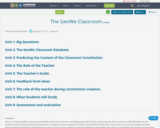
This is a teacher guide for operating a GenWe classroom. From the very beginning to the launch of the program, these resources will help teachers and students build the ideal learning environment to improve social competence. What is the GenWe Classroom? It is an elective course for middle and high school students designed to help them learn how to interact and cooperate and use technology responsibly. The class is managed by the students and teachers collaboratively. The structure of the class allows the students to make decisions based on evaluating the input from peers, near-peers, and adults. In order for normal social situations to occur, the students need to be allowed to manage themselves, including their learning. Ideally the GenWe Classroom will include a budget. Students will be responsible for planning the learning materials they will need for the semester.
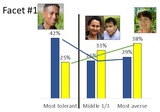
Useful graphics and slides for dispelling fears about GenderMag and stereotyping.
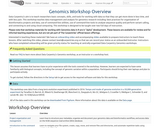
Workshop overview for the Data Carpentry genomics curriculum. Data Carpentry’s aim is to teach researchers basic concepts, skills, and tools for working with data so that they can get more done in less time, and with less pain. This workshop teaches data management and analysis for genomics research including: best practices for organization of bioinformatics projects and data, use of command-line utilities, use of command-line tools to analyze sequence quality and perform variant calling, and connecting to and using cloud computing. This workshop is designed to be taught over two full days of instruction. Please note that workshop materials for working with Genomics data in R are in “alpha” development. These lessons are available for review and for informal teaching experiences, but are not yet part of The Carpentries’ official lesson offerings. Interested in teaching these materials? We have an onboarding video and accompanying slides available to prepare Instructors to teach these lessons. After watching this video, please contact team@carpentries.org so that we can record your status as an onboarded Instructor. Instructors who have completed onboarding will be given priority status for teaching at centrally-organized Data Carpentry Genomics workshops.

This book is about using the power of computers to do things with geographic data. It teaches a range of spatial skills, including: reading, writing and manipulating geographic data; making static and interactive maps; applying geocomputation to solve real-world problems; and modeling geographic phenomena. By demonstrating how various geographic operations can be linked, in reproducible ‘code chunks’ that intersperse the prose, the book also teaches a transparent and thus scientific workflow. Learning how to use the wealth of geospatial tools available from the R command line can be exciting, but creating new ones can be truly liberating. Using the command-line driven approach taught throughout, and programming techniques covered in Chapter 11, can help remove constraints on your creativity imposed by software. After reading the book and completing the exercises, you should therefore feel empowered with a strong understanding of the possibilities opened up by R’s impressive geographic capabilities, new skills to solve real-world problems with geographic data, and the ability to communicate your work with maps and reproducible code.
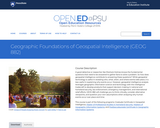
A good detective or researcher like Sherlock Holmes knows the fundamental questions that need to be answered to gather facts to solve a problem. So how does geospatial intelligence contribute to answering these questions? While geospatial technology is useful in revealing who, what, when, and where events take place, it is less useful in explaining why events occur. However, geospatial intelligence analysis leverages geographic information science and technology with the intelligence tradecraft to develop products that support decision-making in national and homeland security, law enforcement, emergency management, and international relief efforts. GEOG 882 will challenge you to think critically, consider alternative viewpoints, and question your own assumptions when analyzing why human events occur over place and time.
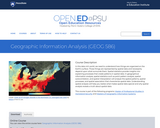
In this data rich world, we need to understand how things are organized on the Earth's surface. Those things are represented by spatial data and necessarily depend upon what surrounds them. Spatial statistics provide insights into explaining processes that create patterns in spatial data. In geographical information analysis, spatial statistics such as point pattern analysis, spatial autocorrelation, and spatial interpolation will analyze the spatial patterns, spatial processes, and spatial association that characterize spatial data. Understanding spatial analysis will help you realize what makes spatial data special and why spatial analysis reveals a truth about spatial data.

The objective of this assignment is to explore the application of GIS in the planning and implementation of renewable energy projects. Students, divided in a group of 3-4, will analyze the geographical suitability, environmental impact, and socio-economic factors involved in the deployment of renewable energy technologies using GIS tools and techniques.
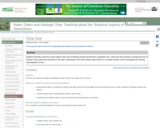
This lab serves to introduce students to geologic time and serves as an outline for the course through the semester.
Students use a tape register and must mark out the corresponding length of each Geologic Era and Eon towards the beginning of the course. Above Western time line Navajo students construct their own time line correlating events as best as possible. As the course progresses starting from 4.6bya each week they must draw major events that occur marking correct subdivisions of time and ages ago. As fossil life gets more complex such as beginning in the Paleozoic students are must take different categories of fossils or different periods so all are doing different things but working together. (Similarly the Navajo time line builds. This time line is taped around the room---and I would have liked to paint the two time lines along the corridor of the building but Maintenance axed it.
(Note: this resource was added to OER Commons as part of a batch upload of over 2,200 records. If you notice an issue with the quality of the metadata, please let us know by using the 'report' button and we will flag it for consideration.)
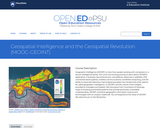
Geographic Intelligence (GEOINT) is more than people working with computers in a secure intelligence facility. Join us for this exciting journey to learn about GEOINT's application in business, law enforcement, and defense. Advances in satellites, GPS, unmanned aerial systems, wireless communications, handheld computing, and the ability to automate laborious map analysis processes has transformed what used to be called geographic intelligence, or GEOINT, and the nature of the insights provided to managers and leaders. We have gone from mountains of hardcopy maps to amazing automated systems that provide previously unavailable understanding. GEOINT combines geographic information science and technologies with an analytic tradecraft. You will experience the value of GEOINT. We welcome you to the Revolution.
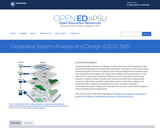
Geospatial System Analysis and Design surveys the process of GIS design through critical reading/writing and collaborative discussion. Key topics in the course outline the broad range of current GIS systems, how they are designed and evaluated, and how emerging technologies may impact their design and implementation in the near future. In particular, students will develop a term-long project where they propose a realistic problem scenario that requires the skills and understanding required to effectively complete a geospatial system specification, design, and implementation. Students completing this course are able to develop a comprehensive system design plan that takes into account current technologies as well as emerging technology trends.
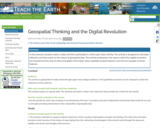
In this exercise students watch a video and then participate in a think-pair-share activity. The activity is designed to stimulate reflection and discussion on the nature of geospatial data. The activity emphasizes the ways in which the digital revolution has transformed the way we think and gather information about spatially located features, and how we navigate to those features.
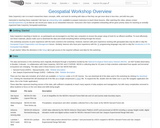
Data Carpentry’s aim is to teach researchers basic concepts, skills, and tools for working with data so that they can get more done in less time, and with less pain. Interested in teaching these materials? We have an onboarding video available to prepare Instructors to teach these lessons. After watching this video, please contact team@carpentries.org so that we can record your status as an onboarded Instructor. Instructors who have completed onboarding will be given priority status for teaching at centrally-organized Data Carpentry Geospatial workshops.

This 6 1/2 minute video introduces students to the pros and cons of using Wikipedia as an information source. There's a Google Form that can be used to check for understanding. Created by Lesley James, Media Literacy & Digital Citizenship Program Supervisor, Washington State Office of Superintendent of Public Instruction
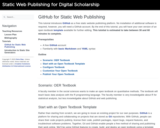
This tutorial introduces GitHub as a free static website publishing platform. No installation of additional software is required, however, you will need a GitHub account. By the end of this tutorial, you will have your own version of an open textbook template available for further editing. This tutorial is estimated to take between 30 and 60 minutes to complete.